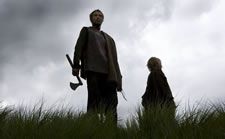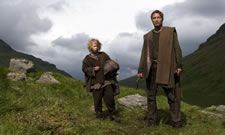
Every now and again, a film comes along that breaks that mould. That's what's being said about Valhalla Rising, whose festival screenings have prompted comparisons with the work of Terrence Malick and Werner Herzog. It's a Viking story that's less Outlander and more Apocalypse Now. A brutalised, one-eyed warrior journeys into the heart of darkness, taking the audience with him.
Scottish producer Karen Smyth is more often associated with gritty urban dramas like One Life Stand and Tracks. So what persuaded her to take on something so unusual?
"It was the director!" she declares without hesitation. "I've admired Nicolas Winding Refn's work for a long time. In 2005 I went to the Gothenburg Film Festival and saw Pusher 2. It was edgy and modern and I loved it, I just thought it had amazing energy. I looked Nicolas up on the internet because I thought he was so talented. Then when I was at a conference another producer said to me that he wanted to shoot a film in Scotland, so I looked into it. He's a very smart director when it comes to things like finance so he'd planned to film in Scotland and America, where he should be able to get the money, and I persuaded him we could do the whole thing here."
The first draft of the script that Karen received intrigued her further. She found that it was written by Roy Jacobsen, author of Frost, an acclaimed book about the Vikings, and she liked its unabashed focus on the brutality of the age. She explains that Nicolas first decided to tell a Viking story when he was staying in Delaware and heard a story on local radio about the discovery of an ancient runestone nearby. Until then he had thought that Christopher Columbus was the first European to reach America, so he started investigating. It was the beginning of an obsession.
The story told in Valhalla Rising is also obsessive. It focuses on a mute warrior played by Mads Mikkelsen, who also starred in Pusher 2; held prisoner by Scottish clansmen, he is forced to fight for their entertainment. The only kindness he experiences comes from the boy who feeds and cares for him, whom he feels compelled to take with him after his escape. As the two embark on a perilous journey, the film simultaneously explores the warrior's complex, uncertain identity.
"Was there ever anyone else but Mads for the role?," I ask.

Karen laughs. "For me, perhaps, but not for Nicolas. He knew what he wanted from the start. But there was a point when we thought we'd lost Mads. He'd been injured making another film and because there's so much physicality to this film we didn't know if he'd be able to do it. We couldn't delay the shoot because there's no way we'd have been able to stay out all day and shoot in the kind of conditions you get in the mountains in winter. At that point one other name came up and that was Viggo Mortensen, but our entire budget would just about have paid his fee. We were very lucky to get Mads after all."
The film was physically hard going for all involved. Karen explains how the cast and crew left Glasgow every morning and drove north for an hour, then used four by fours to carry them further up into the mountains. They had only nine weeks to shoot in so unless they were in danger of actually being swept away by the wind, they had to keep going regardless. She shows me an album of photographs taken on set. The actors are shivering, covered in mud, some of them only partially clothed. The crew are huddled up in warm jackets.
Complicating the shoot still further was Nicolas' preference for shooting in chronological order. Each scene was carefully planned and timed so that this didn't result in a rushed ending, but the last scene was very emotional for all involved - in a way, they had shared the warrior's journey.
Was it difficult to sell such an unusual film - and such a violent one?
"It was the first film to sell at the Toronto Film Festival," Karen point out. "But I think it is an acquired taste. It's an arthouse film and it's very dark and contemplative, but it's a weird sort of hybrid. A lot of films have presented Vikings as big, golden-haired men. They were amazing - they were fantastic traders, seamen, architects and boat builders. But brutality is really at the core of the film - we wanted to show that nature is brutal, men are brutal, and religion is brutal."
Religion is one of the film's other major themes. It's set in the time of Olaf Tryggvason, the Norwegian king whose conversion to Christianity marked the beginning of the end for the old religion of northern Europe. Over the preceding centuries, Christianity had been spreading up from the Middle East. It was then a warring religion, aiming to convert or kill Pagans - like the Vikings - who stood in its way. To many Vikings it was horrifying. "They drink the blood and eat the corpse of their god," one of the film's characters declares in disgust. Karen sees this as part of a cycle of religious aggression which is just as much a part of life today.
With regard to the film, she argues that what they were really worshipping was violence. "One Eye has an ability to beat everybody else that seems supernatural. It's like the Nietzschean principle of Man and Superman. Is he a man, is he a god? Nobody is sure."
Nicolas was apparently keen to bring this violent vision to life as realistically as possible. He disdained CGI, instead relying on high quality make-up and prosthetics. "We spent £8,000 on the severed head alone!" Karen reveals. "But it was important to us to do something that was really different. Films made in Scotland tend to focus on social realism and we wanted to think outside that box, to show that we can create a very different sort of film. I think it's a fantastic piece of work."
Valhalla Rising is out now in cinemas across the UK.





















